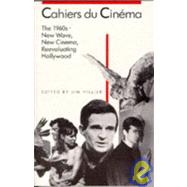
Cahiers du Cinéma : The 1960s - New Wave, New Cinema, Reevaluating Hollywood
by Hillier, JimBuy New
Rent Textbook
Used Textbook
We're Sorry
Sold Out
eTextbook
We're Sorry
Not Available
How Marketplace Works:
- This item is offered by an independent seller and not shipped from our warehouse
- Item details like edition and cover design may differ from our description; see seller's comments before ordering.
- Sellers much confirm and ship within two business days; otherwise, the order will be cancelled and refunded.
- Marketplace purchases cannot be returned to eCampus.com. Contact the seller directly for inquiries; if no response within two days, contact customer service.
- Additional shipping costs apply to Marketplace purchases. Review shipping costs at checkout.
Summary
Table of Contents
| Preface | |
| Acknowledgments | |
| Books frequently cited in the text | |
| Introduction: Cahiers du Cinema in the 1960s | |
| New Wave/French Cinema | |
| Introduction: Re-thinking and re-making French cinema | |
| 'Jean-Luc Godard' (April 1960) | |
| 'The Purest Vision: Les Bonnes Femmes' (June 1960) | |
| 'Marienbad Year Zero' (September 1961) | |
| 'From Critic to Film-Maker': Godard in interview (December 1962) | |
| 'The Misfortunes of Muriel' (November 1963) | |
| Cahiers du Cinema: 'Twenty Years of French Cinema: The BestFrench Films since the Liberation' (March 1965) | |
| 'The Old and the New': Rohmer in interview with Jean-Claude Biette, Jacques Bontemps, Jean-Louis Comolli (November 1965) | |
| 'Pagnol' (December 1965) | |
| 'Polemic: Lelouch, or the Clear Conscience' (July 1966) | |
| 'Evolution of the New Wave': Truffaut in interview with Jean-Louis Comolli, Jean Narboni (May 1967) | |
| American Cinema: Celebration | |
| Introduction: The Apotheosis of mise en scene | |
| 'Nicholas Ray's Reply: Party Girl' (May 1960) | |
| 'In Defence of Violence' (May 1960) | |
| 'Sunspots' (August 1960) | |
| 'The Beauty of Knowledge: Joseph Losey' (September 1960) | |
| 'Hitch and his Audience' (November 1960) | |
| 'A Laboratory Art: Blind Date' (March 1961) | |
| American Cinema: Revaluation | |
| Introduction: Re-thinking American Cinema | |
| 'Questions about American Cinema: A Discussion' (December 1963-January 1964) | |
| 'The Ironical Howard Hawks' (November 1964) | |
| 'A King in New York: King Kong' (May-June 1965) | |
| 'Twenty Years On: A | |
| Table of Contents provided by Publisher. All Rights Reserved. |
An electronic version of this book is available through VitalSource.
This book is viewable on PC, Mac, iPhone, iPad, iPod Touch, and most smartphones.
By purchasing, you will be able to view this book online, as well as download it, for the chosen number of days.
Digital License
You are licensing a digital product for a set duration. Durations are set forth in the product description, with "Lifetime" typically meaning five (5) years of online access and permanent download to a supported device. All licenses are non-transferable.
More details can be found here.
A downloadable version of this book is available through the eCampus Reader or compatible Adobe readers.
Applications are available on iOS, Android, PC, Mac, and Windows Mobile platforms.
Please view the compatibility matrix prior to purchase.
